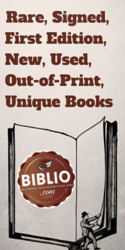From the Boar’s Nest
One of the good things that's happened from changing the way this magazine is run, is that it's given me time and space to get back to my bookselling roots. During the Christmas season I attempted a serious house-cleaning of the office for the first time in years and discovered some wonderful books I'd bought over 25 years ago and had nearly, well to be really honest, completely forgotten about. In the coming year I hope to catalogue and list some of them on the “Booksellers' Gulch” page of our website.
In the meantime I'm spending most of my winter evenings, during what television people generally call prime time, holed up in my “boar's nest” (a term borrowed, or stolen if you will, from my friend Jim) reading through the stash of books bought at the Bloomsbury Book Fair this past November. I like reading several books at once—some demand being read in great chunks, sometimes in one or two sittings, as was the case recently with The Guernsey Literary and Potato Peel Pie Society and State of Jones, while others are to be sipped slowly over time like a good wine, as is now the case with Pir Vilayat Inayat Khan's Awakening, A Sufi Experience. Other books in the current reading mix include A.A. Milne's Behind the Lines, John Bagot Glubb's A Soldier with the Arabs, and Robin Lane Fox's Alexander the Great.
In the Foreword to Awakening... Zia Inayat Khan, son of the author, quotes one of the earliest Sufi mystics and teachers, Ibn al Arabi (1165-1240), who lived most of his early life in Murcia and Seville in southern Spain. Al Arabi encouraged his 12th and 13th century Muslim followers and contemporaries to
Beware of confining yourself to a particular belief and denying all else, for much good would elude you—indeed, the knowledge of reality would elude you. Be in yourself a matter for all forms of belief, for God is too vast and tremendous to be restricted to one belief rather than another...
I'd drink to that in a heartbeat. In a world that has become more polarized along political and religious lines, a little 12th and 13th century religious philosophy, far ahead of its and much of our own time, doesn't seem like such a bad idea. It sure beats much of what's in Deuteronomy, especially 25:11-12.
Until reading Awakening... I knew very little about the Sufi branch of Islam—according to my limited understanding they were a group of fun-loving Muslims who combine rather interesting and unusual dance moves helped along, perhaps, by some independent pharmaceutical research. But there's a lot more to it, as I'm slowly finding out.
In Behind the Lines (1940), bought from Solomon Saul at the Bloomsbury Book Fair (I always find something interesting at Sol's stand—on the last trip it was a collection of 17th century Dutch pamphlets bound in vellum), Milne reacts to the unfolding events of the early days of the second World War in a slim volume of verse (in all likelihood addressed to himself as much as anyone else) explaining his shifting attitude toward war. As a sometime pacifist or at least a pacifist sympathizer, he wrote Peace with Honour (1934) as a condemnation of World War I—but after seeing what Hitler had in mind for Europe, he followed up with War with Honour (1940). His changing opinion is reflected on the dedication page of Behind the Lines—“To my affinity C.R. Milne: Scholar of Trinity: and: by the time this appears: with any luck a private in the Royal Engineers”.
Christopher Robin, who had to endure the taunts of school-mates because of the obvious connection to his father's Pooh stories, did go on to join the Royal Engineers and in later years ran the Harbour Bookshop in Devon. He died in 1996 as a true-believing atheist by some accounts, probably influenced, as sons sometimes like to think they are not, by the views of his father who was quoted as having said “The Old Testament is responsible for more atheism, agnosticism, disbelief—call it what you will—than any book ever written; it has emptied more churches than all the counter-attractions of cinema, motor bicycle and golf course”. Old Deuteronomy again—with apologies to T.S. Eliot.
I've also nearly finished reading John Bagot Glubb's A Soldier with the Arabs (London, 1957). Glubb “Pasha” had a long and distinguished career with the British army before signing on with Amir (King) Abdulla of Trans-Jordan in 1939 to take over command of the Arab Legion that had fought along side the British during World War II. As a soldier-historian (with a bibliography to show for it), I think Bagot Glubb had more knowledge and command of the realities of the region than most, if not all, of the bureaucrats warming the seats in Whitehall at the time. He certainly was light years ahead of the people advising the most recent Bush administration to wit “...it is easy to conquer any Arab country, but their natural inclination to rebellion makes it difficult and expensive [emphasis added] for the invader to maintain his control...”
It's a very readable personal memoir, amply supported by recorded or remembered conversations, letters, dispatches, contemporary photographs and 28 maps (especially helpful) interspersed with plenty of historical background as well as his personal opinions on the state of affairs. And his occasional descriptive passages manage to convey a good sense of the terrain.
Already thin columns of blue smoke were rising into the air from scattered bivouacs spread over the plain. Away to the south, imprisoned between the rocky walls of the mountains of Judea and Moab, the Dead Sea lay like a silver mirror...To the east of us, the steep wall of the Trans-Jordan mountains was lit up by a rose-pink glow from the setting sun...
John Bagot Glubb served King Abdulla faithfully until the latter's assassination in 1951 and in 1956 was ordered to leave the country by Abdulla's son and successor, King Hussein, in an effort to burnish Jordan's diplomatic credentials with other Arab governments in the region who were accusing the Jordanians of colluding with Israel and its supporters in the West and the Soviet bloc. The irony is that Jordan's tiny Arab Legion, although outnumbered by about 12 to 1, were for all practical purposes the only effective fighting force able to prevent much of the West Bank from being totally taken over in 1948. By way of comparison, many of the military volunteers from countries other than Jordan, some of whom distinguished themselves by looting the Palestinian villages they passed through, were generally disorganized, mostly working at cross purposes with the Arab Legion, and in many cases about as effective as Tully Bascombe and his merry band of foresters from the Grand Duchy of Fenwick.
I don't have much of a progress report on Robin Lane Fox's Alexander the Great since I tend to read history more slowly these days, and with 500 pages plus 65 pages of supplementary material including index and notes, there's a lot to absorb. Of course there's always the problem of figuring out how much of Alexander's history is actually true and how much legend or romance. In spite of a notable lack of original sources or solid written evidence, Fox states that “nonetheless, 1472 books and articles are known to me on the subject in the past century and a half, many of which adopt a confident tone and can be dismissed for that alone...”
A few years ago I wrote a short piece on Alexander and I may have drawn on some of the writers with the “confident tone” that Fox mentions. In any case I spotted the book at the Quinto bookshop on Charing Cross Road, and bought it on the strength of Robin Lane Fox being the gardening correspondent for the Financial Times and one of my favorite columnists in the weekend edition. His main area of expertise is Greek and Latin literature and history and early Islamic history, having served both as lecturer in Ancient History at Exeter College (Oxford University) and tutor in Oriental Studies at New College (Oxford). With an engaging writing style bolted on to solid academic credentials, I look forward to a worthwhile read.
What all of these books have in common is that they are mainly out-of-print, definitely not on the best seller lists, but readily available in the antiquarian book trade—where most of the good stuff has always been.
Don't Forget to Read Your Mailing Label!
There's a lot to report about the changes ahead and the reaction so far has been generally supportive and encouraging, some of it backed up with new subscriptions and extensions of current ones, even though the traditional subscription model has changed. So it does look as if we'll continue publishing on paper for a while—at least through 2010.
One of the important things to keep in mind is that we're no longer sending renewal notices and from what I've been told other magazines are starting to do much the same. The information on the top line of your mailing label, while not very fancy, will tell you all you need to know about the status of your subscription. If it says, for example, “Mar/Apr 2010 (A-List)” it simply means that your subscription has just expired and that an annual donation of support would be welcome, upon receipt of which the label will be updated accordingly. If the date passes and nothing happens, you won't be dropped from our mailing list, but your label will be changed to read “Comp (B-List)”. “A-List” people will be entitled to the free trade listings or any other any “perks” that might apply—now or in future.
At present we definitely plan to carry on with the Catalogues Received column, if only to remind younger readers that there was a time when many more booksellers published and distributed catalogues of out-of-print, antiquarian and rare books, some of them including a great deal of supplementary scholarly and bibliographical information, with standards of descriptive detail occasionally found wanting on some of the bookselling sites. I think I may have understated that last part.
Also, after reading and listening to some of your comments, we've decided to continue with the Specialists' Directories and the Open Shop Guides. Until now we had no real idea that many of you find those features to be very useful in learning about who some of the current active members of the antiquarian book trade are. The old AB Bookman's Weekly and AB Bookman's Yearbook did much the same with more fulsome detail, but that was a different century. So for the present we'll try to carry on being what some people have called the unofficial “radar screen” of general activity in the antiquarian book field—on paper that is. There's plenty more on the Internet, but only if you can find it.
I imagine now that we're no longer sending out renewal notices, some booksellers might let their support of BSM drop and in so doing accidentally give up their trade listings. If that happens, and to a degree it probably will, there will be no follow-up reminders. I suppose if it ever gets to the point that there are too many on the B-List for the A-List people to support, that common sense would suggest we call it a day.
On balance, though, there's a certain sense of freedom and peace of mind that comes with knowing that the worst that can happen is that I'd have a lot more time to mess about with books and experiment with some of the newer dahlia varieties—tending bees in Sussex never really appealed to me anyway.

























